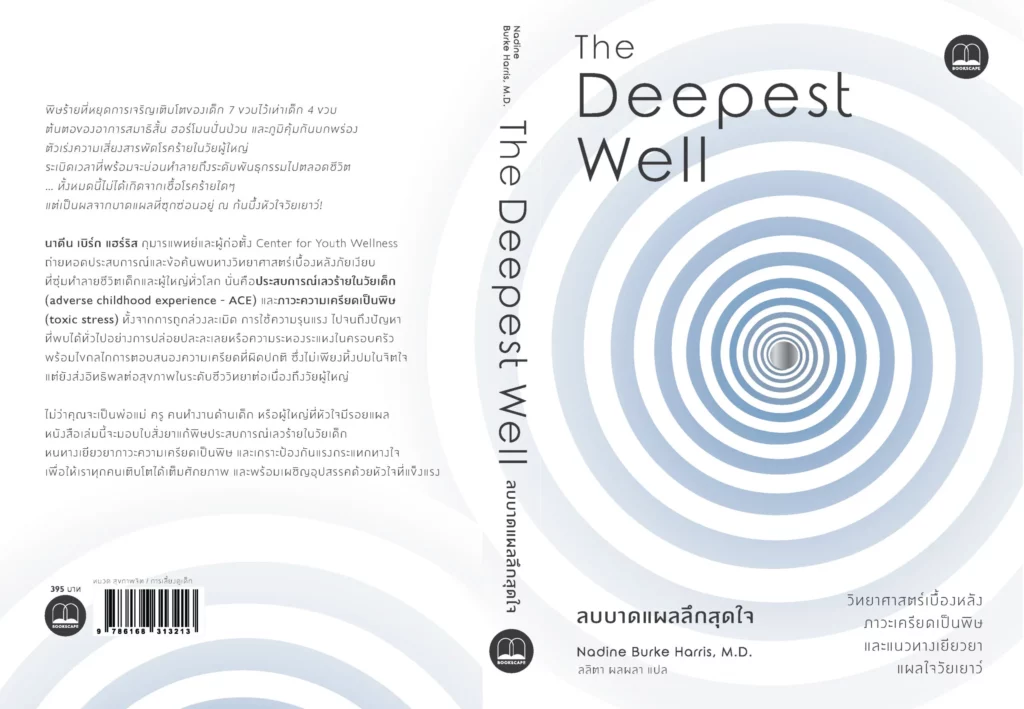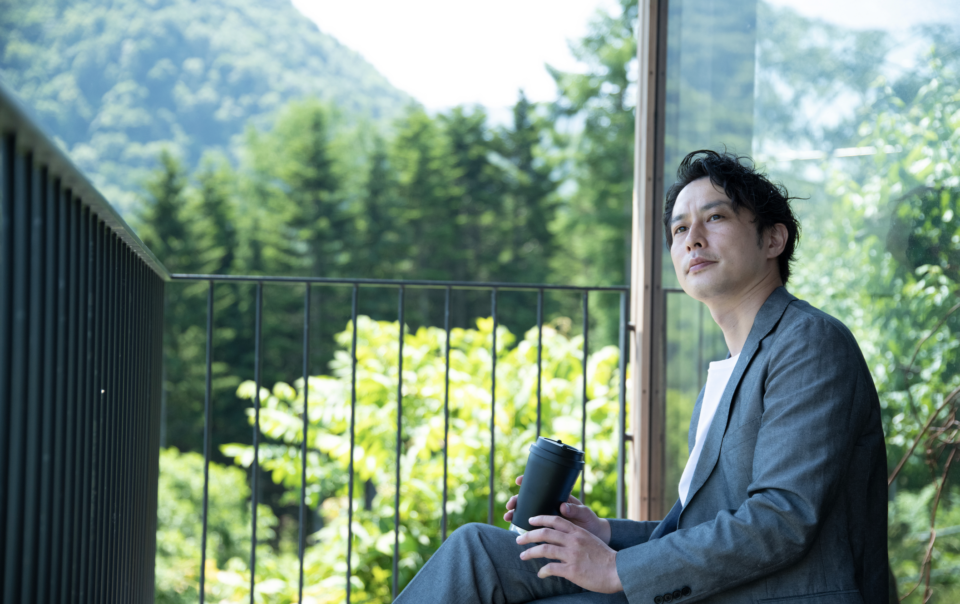
The Deepest Well – ลบบาดแผลลึกสุดใจ เป็นหนังสือเขียนโดย Nadine Burke Harris เธอได้ค้นพบผลกระทบอันลึกซึ้งของความทุกข์ยากในวัยเด็กและความเครียดที่มีต่อสุขภาพร่างกายและจิตใจ จากประสบการณ์ของเธอในฐานะการเป็นกุมารแพทย์ เธอได้เจาะลึกแนวคิดเรื่องความเครียดที่เป็นพิษ ซึ่งเผยให้เห็นถึงผลที่ตามมาต่อสุขภาพในระยะยาวจนถึงวัยผู้ใหญ่ได้
ประสบการณ์เลวร้ายในวัยเด็ก (Adverse Childhood Experience – ACE) และ ภาวะความเครียดที่เป็นพิษ (Toxic Stress) ซึ่งมีได้หลากหลายสาเหตุ เช่น การถูกล่วงละเมิด การใช้ความรุนแรง หรือ ปัญหาการถูกปล่อยปะละเลย หรือ ความระหองระแหงในครอบครัว สิ่งเหล่านี้ทำให้เกิดปมในจิตใจในวัยเด็ก ซึ่งจะส่งอิทธิพลต่อสุขภาพต่อเนื่องถึงวัยผู้ใหญ่ได้
หนังสือเล่มนี้เน้นย้ำถึงการให้ความสำคัญของความยืดหยุ่น ความสัมพันธ์ที่ดี และการดูแลตัวเองในการบรรเทาผลกระทบของความเครียดในวัยเด็กผ่านการเล่าเรื่องประสบการณ์เลวร้ายในอดีตและข้อมูลเชิงลึกทางวิทยาศาสตร์ แฮร์ริสสนับสนุนแนวทางการดูแลสุขภาพและการศึกษาโดยคำนึงถึงบาดแผล โดยเรียกร้องให้สังคมจัดการกับต้นตอของความทุกข์ยาก ด้วยการผสมผสานเรื่องราวส่วนตัวและความเชี่ยวชาญทางการแพทย์เข้าด้วยกัน หนังสือเล่มนี้จึงทำหน้าที่เป็นแนวทางโดยกระตุ้นให้ผู้อ่านรับรู้ เข้าใจ และจัดการเชิงรุกถึงผลกระทบของประสบการณ์ในวัยเด็กที่จะส่งผลต่ออนาคตของพวกเขาในระยะยาว
“ร่างกายและจิตใจของคุณเชื่อมโยงกันอย่างซับซ้อน ความเครียดไม่เพียงส่งผลต่อสุขภาพจิตของคุณเท่านั้น แต่ยังรวมถึงความเป็นอยู่ที่ดีทางร่างกายของคุณด้วย”
ต่อไปนี้เป็นบทเรียนสำคัญ 10 บทเรียน ที่ได้เรียนรู้จาก หนังสือ “The Deepest Well – ลบบาดแผลลึกสุดใจ” โดยที่พวกเราสามารถนำไปใช้กับงานและชีวิตของเราได้:
1. ความสามารถในการฟื้นตัว (Resilience) เป็นทักษะ: เราต้องเปลี่ยนความคิดใหม่ ต้องเข้าใจว่าเรื่องความยืดหยุ่นไม่ได้เกิดขึ้นมาตั้งแต่กำเนิด แต่เป็นทักษะที่คุณสามารถสร้างและพัฒนาได้ คุณต้องยอมรับความท้าทายด้วยกรอบความคิดแบบเติบโต (Growth Mindset) พร้อมที่จะแสวงหาแนวทางแก้ไข กับเรื่องความผิดพลาด และปรับปรุงให้ดีขึ้น
2. รับรู้ถึงความเครียดในวัยเด็ก: รับรู้ถึงผลกระทบอันลึกซึ้งของความเครียดในวัยเด็กที่มีต่อชีวิตและพฤติกรรมในปัจจุบันของคุณ ไตร่ตรองถึงอดีตของคุณและอิทธิพลจากความเครียดในวัยเด็กที่มีต่อตัวเลือกของคุณในปัจจุบันหรืออนาคต
3. การเชื่อมต่อระหว่างจิตใจและร่างกาย: เรียนรู้ว่าความเครียดส่งผลต่อร่างกายและจิตใจของคุณอย่างไร หมั่นฝึกสติ และออกกำลังกายสม่ำเสมอ และลองใช้เทคนิคการจัดการความเครียดเพื่อสุขภาพที่ดีขึ้นในวันนี้และในระยะยาว
4. จัดการกับความเครียดที่เป็นพิษ: ระมัดระวังความเครียดที่เป็นพิษ ซึ่งอาจจะส่งผลเสียต่อสุขภาพของคุณในระยะยาว ต้องรู้จักเริ่มใช้มาตรการเพื่อปกป้องตัวคุณเองและคนที่คุณรักจากผลกระทบของมัน
5. รักษาความสัมพันธ์ที่ดีกับคนรอบข้าง: ปลูกฝังความสัมพันธ์เชิงบวกที่แข็งแกร่งกับคนใกล้ชิด คนในครอบครัวเนื่องจากการมีความสัมพันธ์ที่ดีจะมีบทบาทสำคัญในความเป็นอยู่ที่ดี คุณจะต้องลงทุนเวลาและความพยายามในการสร้างและรักษาความสัมพันธ์เหล่านี้เอาไว้
6. การดูแลตัวเองเป็นสิ่งสำคัญ: ต้องจัดลำดับความสำคัญของการดูแลตัวเองว่าเป็นสิ่งจำเป็นและสำคัญ ไม่ใช่สิ่งฟุ่มเฟือย หรือ ปล่อยปะละเลยได้ ผสมผสานแนวทางปฏิบัติในการดูแลตนเองเข้ากับกิจวัตรประจำวันของคุณ เพื่อรักษาสุขภาพกายและสุขภาพจิตใจของคุณ
7. การรักษาผ่านความเห็นอกเห็นใจ: เข้าใจพลังของความเห็นอกเห็นใจในการรักษาบาดแผลทางอารมณ์ ฝึกความเข้าใจ ความเห็นอกเห็นใจ และความเมตตาในการมีปฏิสัมพันธ์กับผู้อื่น
8. รับรู้และเข้าใจถึงประสบการณ์เลวร้ายในวัยเด็ก(ACE): เข้าใจถึงประสบการณ์เลวร้ายในวัยเด็กของคุณ เรียนรู้กับมัน เข้าใจสิ่งที่เกิดขึ้น เพื่อแก้ไขผลกระทบที่มีต่อพฤติกรรมและทางเลือกของคุณในปัจจุบันและอนาคต
9. พัฒนาความฉลาดทางอารมณ์: ฝึกฝนความฉลาดทางอารมณ์ของคุณ เพื่อความสัมพันธ์ที่ดีขึ้นและการตัดสินใจที่ดีขึ้น ทั้งที่ทำงานและที่บ้าน เข้าใจและจัดการอารมณ์ของตนเองอย่างมีประสิทธิภาพ
10. แสวงหาพลังสนับสนุนจากชุมชน: แสวงหาและดูแลชุมชนที่สนับสนุนในชีวิตส่วนตัวและอาชีพของคุณ เครือข่ายเหล่านี้สามารถให้คำแนะนำและเสริมความแข็งแกร่งในช่วงเวลาที่คุณต้องเจอกับความท้าทายได้
“ความสามารถในการปรับตัวเป็นทักษะที่สามารถปลูกฝังได้ มันเกี่ยวกับวิธีการที่คุณรับมือกับความยากลำบากและความพ่ายแพ้ และวิธีที่คุณฟื้นตัวจากความท้าทายในชีวิต”
หนังสือ “ลบบาดแผลลึกสุดใจ : วิทยาศาสตร์เบื้องหลังภาวะเครียดเป็นพิษ และแนวทางเยียวยาแผลใจวัยเยาว์”

รายละเอียดเพิ่มเติม https://shope.ee/1AwwzYRBB3
บทความแนะนำ:
Work – ประวัติศาสตร์แห่งการทำงาน (ไปทำไม) โดย James Suzman







